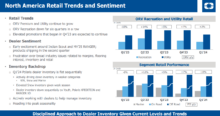A F&I regulation that is scrutinized more than ever
 How much money can we accept? Too often we take for granted that everyone knows if F&I accepts cash funds in excess of $10,000, they must reported it to the federal government on Form 8300. BUT:
How much money can we accept? Too often we take for granted that everyone knows if F&I accepts cash funds in excess of $10,000, they must reported it to the federal government on Form 8300. BUT:
- Do you know the timeframe includes multiple deals in the same year?
- When are the forms sent and who must receive them?
- Do you know when not to send a notice to the customer?
- What is “considered and qualifies” as cash?
- Why is Big Brother watching more now than ever?
Most dealers I ask say they are in compliance. However, when asked what checks and balances they have in place, they usually start stuttering and realize they really do not know.
Today this regulation is scrutinized more than ever. Originally, it was put into effect to screen for illegal drug money. But now it has been incorporated into the Patriot Act. Federal agencies require Form 8300 to ensure terrorists do not use any loopholes to launder money for their purposes. Here is a snapshot of what is required:
- You must report cash in excess of $10,000 within 15 days after receiving the money. If you take $5,000 on a deal in February and another $5,000 in July from the same customer, these payments total $10,000 and must be reported.
- Then you are required to send the customer a notice that you filed a Form 8300 by Jan. 31 of the subsequent year.
- The exception to this rule is if you deem these funds are suspicious (We are not detectives, but we usually know when something is wrong.). There is a block on the Form 8300 to mark a suspicious activity. When this occurs, you are instructed not to notify the customer in any way — only fill out and file the form — and let the Feds take care of the rest.
- Cash includes currency of the United States as well as other countries’ currencies. It also can include other certain money instruments, such as certain cashier checks, bank drafts, travelers checks and money orders.
Form 8300 has many specific details, and I have only touched on a few of the high spots.
Outside of the above filing issues, the biggest problem arises when any of your people attempt to help in any way to structure a deal to avoid filing Form 8300. Never use any tactics to try to avert filing when it is necessary, like:
- Telling the customer to only put a certain amount down so you don’t have to file
- If the customer asks if you are going to file, only tell them that you follow all federal rules and requirements.
The penalties for non-compliance can be quite severe.
- If you purposely disregard reporting, the penalty is the greater of $25,000 or the amount of cash you were required to report up to $100,000.
- If you purposely file a false or fraudulent report or try to structure a transaction, you can be fined up to $250,000 ($500,000, if you are a corporation) and sentenced up to five years in prison or both.
So, check your procedures to make sure they are being followed and that you are in compliance.








